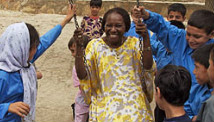EAST JERUSALEM: Traditional Chinese Medicine (TCM) is slowly gaining popularity in North Africa and the Middle East.
But advocates still face an uphill task of convincing governments to accept it as an alternative form of medical treatment.
Dr Adi Fromm's hospital ward is well known throughout Israel.
Patients disheartened with Western painkillers come here looking for relief.
An example is a man who suffered from pain in his legs for years.
Nothing helped until Dr Adi introduced him to Chinese "magic needles" or acupuncture.
Dr Fromm, who is the head of the TCM Association Israel, said: "The first challenge is to make the Western medicine profession understand that TCM is a valid tool in what I call the 'health basket' that we can give to people...we are still fighting for our legitimacy (among practitioners of) Western medicine."
TCM dates back more than 5,000 years, but it is now slowly being embraced as a holistic alternative to Western medicine in many countries across the Middle East and North Africa.
In Israel, it was only formally recognised in the early 1990s.
Despite its popularity, it is still not widely used by the mainstream healthcare system.
In places like Tunisia in North Africa, there is even less awareness.
Practitioners here face an uphill battle in seeking acceptance of TCM.
Twenty years ago, the first Chinese doctors visited these shores. Since then, the number of acupuncturists has been steadily growing.
Dr Mohammed Juaied, a TCM doctor in Tunis, said: "A lot of people are asking for this type of medicine and we are hoping that more doctors here will be trained in this type of treatment."
Suspicion and lack of knowledge mean it is hardly practised at all.
Dr Abbas Elias Yousef Zaro, an alternative medicine practitioner, is trying to change all this.
From his modest clinics in East Jerusalem and Ramallah, he brings hope to dozens of Palestinian patients frustrated with modern medicine.
He said: "When I finished my studies and came back to Palestine, I opened a clinic in Ramallah. For the first five years, people did not accept it very much but things have changed since then. Still, the government has no plans to bring alternative medicine to the hospitals."
This echoes Dr Layla Abu Ahmmad Esmaeel's experience across the border.
Although her clinic sees a steady stream of well-to-do Egyptians, she is lobbying her government for greater recognition of this ancient science.
Dr Layla, from the Acupuncture Clinic at the National Research Centre, said: "We are working hard with the Egyptian government to approve this kind of medicine because the Minister of Health (has) not (approved) TCM. A lot of doctors are practising this kind of medicine without...enough knowledge."
Elsewhere in the world, TCM has been more readily accepted.
There are laws in countries as far afield as Australia and South Africa that regulate and protect it.
This is an encouraging sign for its advocates in the Middle East.
TCM has come a long way in overcoming the misunderstandings and criticisms of the Western world. In recent years, its popularity, especially in the Middle East, has grown, allowing it to be used more frequently in treating the pains and stresses of the region.
- CNA/ms
















